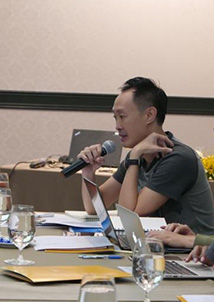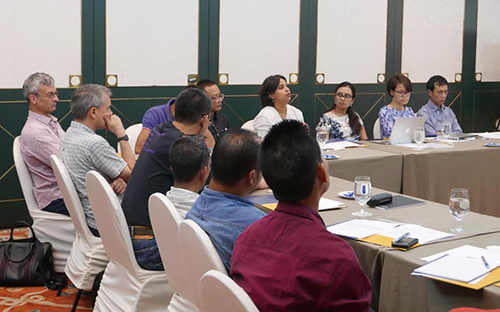 Chalermsak Kittitrakul from AIDS Access Foundation, Thailand, presents during the meeting.The Asia-Pacific region has been particularly hard hit by hepatitis C, one of the five major causes of infectious disease death worldwide. People with HIV are about six times more likely to have hepatitis C virus (HCV) infection than people without HIV,* and currently they are more likely to die from liver disease than from AIDS. New treatments called direct-acting antivirals (DAAs), on the market since 2014, can cure more than 90 percent of people with HCV. Yet because of a lack of screening and treatment programs, together with the high prices of these lifesaving medicines, they remain unavailable to many who need them.
Chalermsak Kittitrakul from AIDS Access Foundation, Thailand, presents during the meeting.The Asia-Pacific region has been particularly hard hit by hepatitis C, one of the five major causes of infectious disease death worldwide. People with HIV are about six times more likely to have hepatitis C virus (HCV) infection than people without HIV,* and currently they are more likely to die from liver disease than from AIDS. New treatments called direct-acting antivirals (DAAs), on the market since 2014, can cure more than 90 percent of people with HCV. Yet because of a lack of screening and treatment programs, together with the high prices of these lifesaving medicines, they remain unavailable to many who need them.
In concert with other organizations, TREAT Asia has been a vocal advocate for improved HCV treatment and expanded access to treatment since before the introduction of DAAs. “TREAT Asia’s first hepatitis C regional planning meeting in 2013 focused on access to and price reduction for pegylated interferon, which was the standard therapy at that time,” said Giten Khwairakpam, TREAT Asia’s project manager for community and policy. “Now, with the availability of DAAs, the situation surrounding policies, advocacy, and treatment availability has changed tremendously.”
DAAs can cure more than 90 percent of people with HCV. Yet because of a lack of screening and treatment programs, together with the drugs’ high prices, they remain unavailable to many who need them.
TREAT Asia hosted its fourth regional strategic meeting on HCV treatment advocacy in Bangkok in August. It was attended by 22 participants from Cambodia, China, Indonesia, India, Malaysia, Nepal, Thailand, and Vietnam, and included representatives from key population regional networks, Médecins Sans Frontières (MSF) Access Campaign, the Drugs for Neglected Diseases Initiative (DNDi), and the Lawyers Collective (a public interest service provider in India).
“The consultation identified three broad advocacy areas for immediate action: addressing global quality assurance and national regulatory issues to make DAAs more quickly available; advocating for improved access to hepatitis C diagnosis and treatment at the national level, including among people who use drugs; and creating overall access to DAAs,” said Mr. Khwairakpam. Follow-up will include contacting multiple international agencies and health care providers to facilitate quality assurance processes and to ensure that marginalized populations are not left behind in any new screening or treatment programs.
The participants agreed to work towards documenting and publicizing the registration status of DAAs in countries in the region and beyond, in order to work with national partners to reduce regulatory barriers and ensure affordable pricing as well as to monitor patent applications, pre-grant oppositions, and other registration processes. “TREAT Asia will also continue to update and share pricing and availability information on Indian generic DAAs on the hepCAsia website, which it maintains together with the Asia Pacific Network of People Living with HIV (APN+),” said Mr. Khwairakpam. The meeting participants are also reviewing advocacy opportunities for prioritizing hepatitis B vaccination for key populations, including people who use drugs, sex workers, and men who have sex with men.

Participants at the consultation. Leena Menghaney of Médecins Sans Frontières, fourth from right, is speaking.
There was further discussion around how to capitalize on these recent efforts to promote hepatitis C treatment in order to extend advocacy around other new and priority medicines for people living with HIV. For example, community organizations in the region are less familiar with the HIV medicine dolutegravir and the tuberculosis drugs bedaquiline and delamanid. All three medicines can be used to treat multidrug-resistant infections, but are seldom available for patient care due to lack of drug registrations and high prices.
“Our partnership—our sharing of skills and expertise to break down intellectual property and regulatory barriers to create speedy access to the new DAAs for hepatitis C—is showing results, with an increased supply of low-cost generics starting to change the public health response to the disease,” said consultation member Leena Menghaney, the South Asia Manager of the Access Campaign at Médecins Sans Frontières. “We should work on strengthening this collaboration to ensure we use these experiences for broader access to all medicines, which would include new HIV drugs, pediatric formulations, and medications for deadly co-infections—particularly for drug-resistant tuberculosis.”
In order to build momentum around bringing these medicines to patients in the Asia-Pacific, TREAT Asia will work with partners to establish a new technical working group to develop community-friendly education resources, explore how to engage in national regulatory processes to approve importation of these medicines, and address intellectual property issues that limit access.
*World Health Organization. More than 2 million people coinfected with HIV and hepatitis C. March 7, 2016.